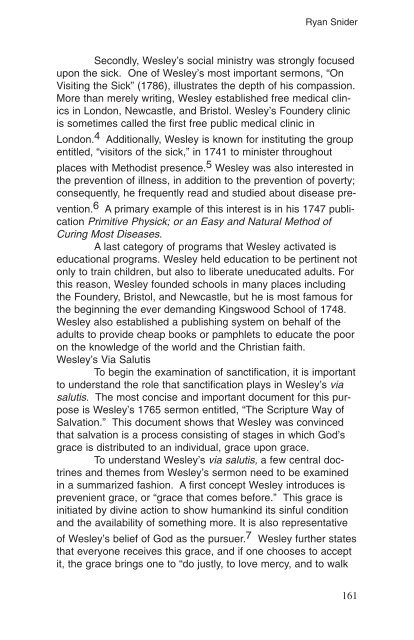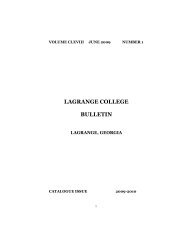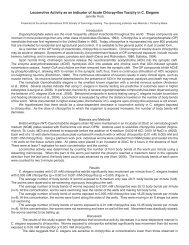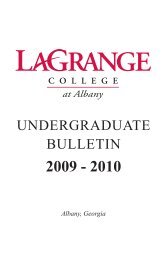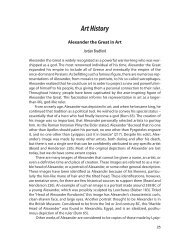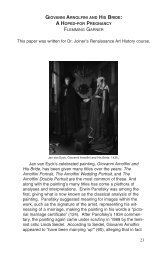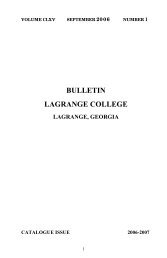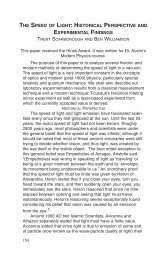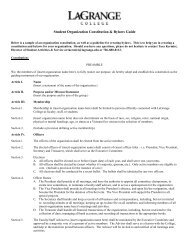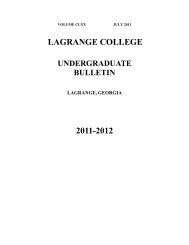Works of Mercy as a Vital Component to Sanctification - LaGrange ...
Works of Mercy as a Vital Component to Sanctification - LaGrange ...
Works of Mercy as a Vital Component to Sanctification - LaGrange ...
Create successful ePaper yourself
Turn your PDF publications into a flip-book with our unique Google optimized e-Paper software.
Ryan Snider<br />
Secondly, Wesley’s social ministry w<strong>as</strong> strongly focused<br />
upon the sick. One <strong>of</strong> Wesley’s most important sermons, “On<br />
Visiting the Sick” (1786), illustrates the depth <strong>of</strong> his comp<strong>as</strong>sion.<br />
More than merely writing, Wesley established free medical clinics<br />
in London, Newc<strong>as</strong>tle, and Bris<strong>to</strong>l. Wesley’s Foundery clinic<br />
is sometimes called the first free public medical clinic in<br />
London. 4 Additionally, Wesley is known for instituting the group<br />
entitled, “visi<strong>to</strong>rs <strong>of</strong> the sick,” in 1741 <strong>to</strong> minister throughout<br />
places with Methodist presence. 5 Wesley w<strong>as</strong> also interested in<br />
the prevention <strong>of</strong> illness, in addition <strong>to</strong> the prevention <strong>of</strong> poverty;<br />
consequently, he frequently read and studied about dise<strong>as</strong>e prevention.<br />
6 A primary example <strong>of</strong> this interest is in his 1747 publication<br />
Primitive Physick; or an E<strong>as</strong>y and Natural Method <strong>of</strong><br />
Curing Most Dise<strong>as</strong>es.<br />
A l<strong>as</strong>t category <strong>of</strong> programs that Wesley activated is<br />
educational programs. Wesley held education <strong>to</strong> be pertinent not<br />
only <strong>to</strong> train children, but also <strong>to</strong> liberate uneducated adults. For<br />
this re<strong>as</strong>on, Wesley founded schools in many places including<br />
the Foundery, Bris<strong>to</strong>l, and Newc<strong>as</strong>tle, but he is most famous for<br />
the beginning the ever demanding Kingswood School <strong>of</strong> 1748.<br />
Wesley also established a publishing system on behalf <strong>of</strong> the<br />
adults <strong>to</strong> provide cheap books or pamphlets <strong>to</strong> educate the poor<br />
on the knowledge <strong>of</strong> the world and the Christian faith.<br />
Wesley’s Via Salutis<br />
To begin the examination <strong>of</strong> sanctification, it is important<br />
<strong>to</strong> understand the role that sanctification plays in Wesley’s via<br />
salutis. The most concise and important document for this purpose<br />
is Wesley’s 1765 sermon entitled, “The Scripture Way <strong>of</strong><br />
Salvation.” This document shows that Wesley w<strong>as</strong> convinced<br />
that salvation is a process consisting <strong>of</strong> stages in which God’s<br />
grace is distributed <strong>to</strong> an individual, grace upon grace.<br />
To understand Wesley’s via salutis, a few central doctrines<br />
and themes from Wesley’s sermon need <strong>to</strong> be examined<br />
in a summarized f<strong>as</strong>hion. A first concept Wesley introduces is<br />
prevenient grace, or “grace that comes before.” This grace is<br />
initiated by divine action <strong>to</strong> show humankind its sinful condition<br />
and the availability <strong>of</strong> something more. It is also representative<br />
<strong>of</strong> Wesley’s belief <strong>of</strong> God <strong>as</strong> the pursuer. 7 Wesley further states<br />
that everyone receives this grace, and if one chooses <strong>to</strong> accept<br />
it, the grace brings one <strong>to</strong> “do justly, <strong>to</strong> love mercy, and <strong>to</strong> walk<br />
161


